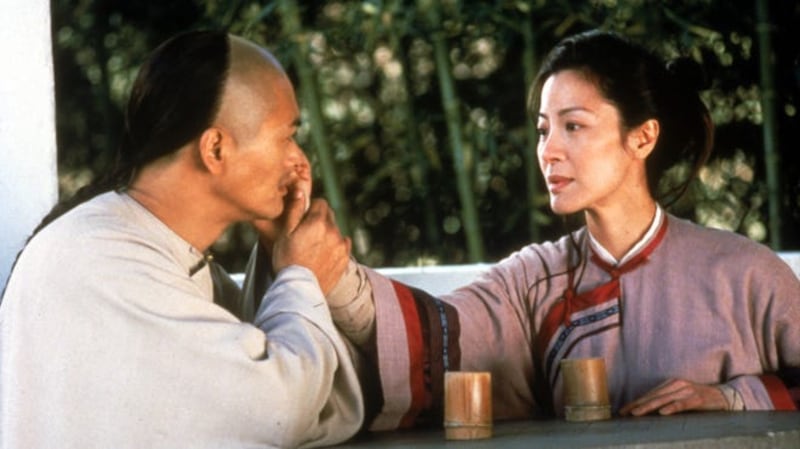Near the end of Ang Lee’s Crouching Tiger, Hidden Dragon (2000), Yu Shu Lien (Michelle Yeoh) learns that her beloved, Li Mu Bai (Chow Yun-fat), is dying. “Let your soul rise to eternity with your last breath,” she tells him. “Don’t waste it for me.”
“I’ve already wasted my whole life,” Mu Bai replies. “I have always loved you. I would rather be a ghost, drifting by your side as a condemned soul, than enter heaven without you. Because of your love, I will never be a lonely spirit.”
It is a hauntingly romantic declaration—a rarity in a film about combatants who cross swords with gusto, but express feelings with restraint. “When it comes to emotions, even great heroes can be idiots,” quips Shu Lien and Mu Bai’s cheeky benefactor Sir Te (the late Sihung Lung, an Ang Lee regular).
Yet Shu Lien and Mu Bai are hardly idiotic. Like many of Lee’s films, Crouching Tiger, Hidden Dragon is a valentine to those who love reservedly but reverently. In most movies, the quiet are freaks to be cured. To Lee, they are heroes whose silence opens their hearts to emotions too often lost in the cacophony of life.
Set in China during the Qing dynasty (and based on part four of author Wang Dulu’s Crane Iron series), Crouching Tiger, Hidden Dragon begins with Mu Bai, a respected warrior, preparing to relinquish his sword, the Green Destiny. “Too many men have died at its edge,” he says. “It only looks pure because blood washes so easily from its blade.”
That may be true, but there’s another reason Mu Bai wants to retire: to be with Shu Lien, who runs a private security company. For years, the two have resisted their shared adoration out of guilt—Shu Lien was engaged to Mu Bai’s slain comrade, Meng Sizhao—but time has diminished their resolve and magnified their desire. “Come with me to Peking,” Shu Lien implores. “It’ll be just like old times.”
Peking turns out to be the problem. While visiting Sir Te, Shu Lien and Mu Bai encounter Jen (Zhang Ziyi), a governor’s daughter who has been secretly training with the master assassin Jade Fox (Cheng Pei-pei, the Come Drink With Me star who has been called “The Queen of Kung Fu”).
Without his guidance, Mu Bai worries that Jen will become “a poisoned dragon.” But the more he obsesses over molding her into the perfect disciple, the more the hope of happiness with Shu Lien fades into the shadows of the forests and temples where the film unfolds.
While Shu Lien takes a motherly interest in Jen, she also dismisses her as “an aristocrat’s daughter” and “not one of us.” What she doesn’t mention is that Jen is as erratic and impassioned as she and Mu Bai are determined and repressed.
Chafing under the demands of her family, Jen lashes out in ways both hilarious and terrifying, even attacking a fellow warrior simply because he has the same name as the man she’s been forced to marry. “Gou? I hate that name,” she announces with relish. “It makes me puke! Too bad you’re named Gou! You’ll be the first to feel my sword today!”

Because she’s embodied by the incandescent Zhang, Jen proves irresistible. But despite her mesmerizing bursts of rage and wit, Lee’s loyalties clearly lie with Shu Lien and Mu Bai, whose discretion in matters of the heart is mirrored by their grace in battles of life and death.
In Crouching Tiger, Hidden Dragon, characters run on walls, walk on water and trade blows while balancing on bamboo branches. The violence is blissfully intense, but it’s less about brutality than it is about seeking oneness with the world around you.
Lee, along with Zhang Yimou and Wong Kar-wai, is one of many contemporary auteurs from the Pacific Rim who have experimented with the traditions of China’s wuxia (“martial heroes”) genre. His inspirations are many, though the most discernible is King Hu’s A Touch of Zen (1971), about a warrior woman (Hsu Feng) whose fight leads her to the precipice of enlightenment.
A similar destination awaits Jen in Crouching Tiger, Hidden Dragon, but not without cost. Only when Mu Bai is poisoned while protecting her from Jade Fox does Jen realize that she must free herself from both the oppression of her family and her belief that the world exists to bear any grievance she can unleash.
Jen reaches that revelation under the influence of Shu Lien, who refuses to lash out at her, despite the partial responsibility Jen bears for the loss of Mu Bai. Yes, Shu Lien holds a blade to her neck, but she quickly sets it aside, saying, “Whatever path you take in this life, be true to yourself.” Even in grief, Shu Lien remains disciplined, embodying the film’s creed: that holding back can be a heroic act.
After Crouching Tiger, Hidden Dragon was released in the United States on Dec. 8, 2000, it won four Oscars and racked up more than $128 million in ticket sales (still the highest ever for a non-English language film). Its success was astounding, particularly in a country whose pop culture contradicts nearly everything it stands for.
American movies (especially when set in high schools) often suggest that the destiny of an introvert is to get over being who they are. Lee—who also offered complex portraits of introverts in Sense and Sensibility (1995) and Brokeback Mountain (2005)—doesn’t buy that. And judging by Crouching Tiger, Hidden Dragon’s popularity, neither does his audience.
You could weep over what Shu Lien and Mu Bai lost by not saying what was in their hearts. But despite Mu Bai’s declaration that he wasted his life, it’s clear that he, Shu Lien and Lee know the truth: A life with love, no matter how quietly expressed, is never a waste.
SEE IT: Crouching Tiger, Hidden Dragon, rated PG-13, opens Friday, Feb. 17, at Cinema 21, 616 SW 21st Ave., 503-223-4515, cinema21.com.
